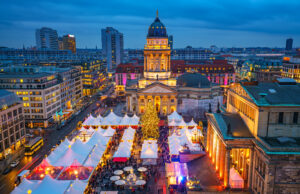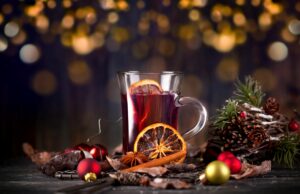
The Essentials
Germany is predominantly known for its profound love for beer, making it the most popular drink in the country. Find out more here…
Germany is home to a vast array of drinks, including beer, wine, schnapps, and non-alcoholic beverages such as Apfelschorle and Spezi. More here…
From diverse beers to traditional spirits like Schnapps and Jägermeister, there are several alcoholic drinks to try in Germany. Read more…
Welcome to our comprehensive guide, dedicated to exploring the diverse range of traditional and modern drinks in Germany that punctuate the German lifestyle. Germany is a country where the history and culture seep into every pint of beer, glass of wine, and mug of coffee. This guide is designed to offer insights into the popular drinks in Germany, from local favorites to lesser-known delights. From understanding why Germans love their beverages so much to discovering what drinks you should not miss out on during your German visit, we’ve got you covered!
Beer: The Reigning King of German Beverages

No discussion about German drinks can begin without acknowledging the reigning king of beverages – Beer. Germany is globally recognized for its beer culture, with more than 1,300 breweries serving up a dizzying variety of beers, from Weissbier (wheat beer) to the crisp Pilsners. The annual Oktoberfest celebration further attests to Germany’s deep-seated beer culture.
Decoding the Varieties: A Symphony of Flavors
From malty Märzen to tangy Berliner Weisse, the German beer palette is rich and diverse. The beer types are as multifarious as the regions they originate from. Bavaria is renowned for Weissbier, a refreshing wheat beer served typically in a tall, slender glass. The northern region, especially Bremen and Hamburg, takes pride in their herb-infused Bockbier.
Did you know?
Weissbier, also known as Weizenbier, this Bavarian specialty is a wheat beer characterized by its light, effervescent nature, and distinct banana and clove notes.
The Beer Purity Law: An Emblem of Quality
The quality of German beer is safeguarded by the famous Reinheitsgebot, or Beer Purity Law, which requires that only water, barley and hops be used in the brewing process. This centuries-old decree underscores Germany’s commitment to maintaining the integrity of its cherished beverage.
Beer Festivals: Beyond Oktoberfest
Yes, Oktoberfest is the world’s largest beer festival and a hallmark of German culture, but it’s not the only one celebrated in Germany. Many local beer festivals take place throughout the year in different regions. Each is a unique opportunity to explore Germany’s rich beer culture.
Wine: The Elegant Alternative
While beer may be the poster child of German drinks, the country’s wines are not far behind in terms of popularity and quality. The vine-clad hills of the Rhine and Moselle rivers produce internationally acclaimed Rieslings and Gewürztraminers. Moreover, the southern region of Baden is known for its exceptional red wines.
The German Wine Spectrum: A Journey through Flavours
Despite its northern location, Germany produces some of the world’s most respected wines, especially Riesling and Gewürztraminer. These aromatic, high-acid wines embody the essence of the country’s cool-climate viticulture.
Celebrated for its elegant, crisp flavor and remarkable versatility, Riesling is the queen of German grapes. Ranging from bone-dry to lusciously sweet, it has something for every palate.
Gewürztraminer is another jewel in Germany’s wine crown. It offers a fuller body and intense aromatics. It’s a perfect match for the country’s robust cuisine.
Tip: Don’t let the sweetness of German wines deter you. They are balanced by high acidity, resulting in a harmonious tasting experience.
Red Wines: The Underdogs of the German Wine Scene
Red varieties may not be the first to come to mind when discussing German wines. However, regions such as Baden and Pfalz are changing this perception by producing exceptional red wines, primarily from the Pinot Noir grape.
“Wine is the poetry of the earth to the heavens.” – This old saying encapsulates the essence of Germany’s wine culture, a harmonious union of the land and the sky.
Wine Festivals and Routes: A Celebration of the Vine
Germany embraces its winemaking heritage with vibrant wine festivals and picturesque wine routes. The Rheingau Wine Festival in Frankfurt and the Middle Mosel Wine Festival in Bernkastel-Kues offer unforgettable wine-tasting experiences.
For a more immersive journey, the German Wine Route in Palatinate and the Mosel Wine Route offer scenic drives through some of the most beautiful vineyards, punctuated by winery visits and tastings.
Schnapps: A Fruitful Heritage
Schnapps is deeply rooted in German tradition. Distilled from a variety of fruits like apples, pears, plums, and cherries, German Schnapps is known for its purity and potent fruit flavors. Unlike sweet liqueurs, it’s typically consumed straight and serves as a digestif after meals.
Jägermeister: The Stag of Spirits
Jägermeister is another quintessential German beverage, albeit one with a distinctly love-it-or-hate-it reputation. This dark, herbaceous liqueur comprises 56 botanicals, resulting in a complex, somewhat medicinal flavor profile. It’s traditionally consumed chilled, often as part of celebratory toasts or in cocktails.
Beyond Schnapps and Jägermeister
Apart from Schnapps and Jägermeister, Germany is home to an array of other unique spirits and liqueurs. Kirschwasser, a clear cherry brandy from the Black Forest region, and Asbach, a brandy from the wine-growing region of Rüdesheim, further enrich the German spirits landscape.
Non-Alcoholic Drinks: Beyond Beers and Wines
Apfelschorle: A Sparkling Sensation
Apfelschorle, a refreshing blend of apple juice and sparkling mineral water, is one of the most popular non-alcoholic drinks in Germany. It’s light, thirst-quenching, and strikes the perfect balance between sweet and tart. It’s a common sight at German gatherings and a favorite among children and adults alike.
Spezi: A Fizzy Fusion
Spezi, a fizzy mix of cola and orange soda, is another non-alcoholic favorite. It may sound unusual, but the mix is surprisingly delicious. It’s a fun twist on regular soft drinks. The original Spezi trademark belongs to the Bavarian brewery Brauhaus Riegele, and major brands like Pepsi and Coca-Cola have their own versions.
Kaffee and Tee: The Warm Comforts
And let’s not forget about the hot beverages as well. Coffee is the daily beverage of choice for many in Germany, which has a vibrant coffee culture. The German coffee scene ranges from the traditional coffee and cake ritual to modern third-wave coffee shops.

A Delightful Digression: Coffee Culture in Germany
While Germany might be world-renowned for its beers and wines, the country also boasts a burgeoning coffee culture. German cities are increasingly filled with coffee houses, serving up everything from traditional Filterkaffee to specialty coffees. Germany is also one of the world’s top importers of green coffee, underscoring the country’s love for a good brew.
Germany’s Caffeinated Love Affair
The German coffee culture can be traced back to the 17th century, when the first coffee houses began to spring up in Bremen and Hamburg. Since then, this love affair with coffee has only grown stronger. Today, Germany is one of the largest coffee consumers in the world, with the average German drinking approximately 150 litres of coffee per year.
Did you know?
This movement views coffee as an artisanal product, akin to wine, rather than a commodity. It emphasizes every step of coffee production, from growing and harvesting to roasting and brewing.
Traditional and modern coffee experiences
The ritual of coffee and cake, typically enjoyed in the afternoon, is at the heart of traditional German coffee culture. This tradition encourages slowing down, socializing, and the enjoyment of a good cup of filter coffee with a slice of homemade cake.
In recent years, however, a new wave of coffee culture has swept across Germany. This is especially true in urban centers such as Berlin, Hamburg, and Munich. Inspired by the third wave of the coffee movement, these modern coffee houses are focusing on the quality and origin of the coffee beans, as well as the brewing techniques. You’ll find baristas making lattes with latte art, serving single-origin pour-overs, and even offering cold brews.
Advice: Enjoy the variety and quality of German drinks, but always in moderation.
Germany’s Role in the Global Coffee Trade
Germany’s love for coffee isn’t just confined to consumption. The country plays a significant role in the global coffee trade, with the city of Hamburg being one of the world’s most important hubs for coffee trading. Germany is a major importer of green coffee beans, which are then roasted by German companies and exported worldwide.
German coffee culture is both a nod to the country’s traditions and a testament to its ability to change and innovate. Whether it’s a classic drip or a meticulously crafted pour-over, you’re experiencing a piece of German culture as rich and inviting as the coffee itself when you sip your cup of German brew.
“Prost!” Your Guide to German Drinking Etiquette
Drinking is not just about the beverages themselves, it’s also about the social rituals that surround them. This is especially true in Germany, where a few simple rules can help enhance your drinking experience. Here are some tips to ensure you’re enjoying your drinks the German way.
1. Toasting is a Must
In Germany, it is customary to make eye contact with the person and to give a slight nod or say “Prost! (Cheers!) before taking the first sip. This is true for both alcoholic and soft beverages. Remember, it is considered bad luck not to make eye contact during a toast!
2. Wait Your Turn in Beer Gardens
It is customary to wait your turn before taking a seat at a communal table in traditional beer gardens. Germans are typically friendly and welcoming, so if you’re unsure, just ask.
3. Respect the Reinheitsgebot
Remember that Germans take their beer seriously when drinking it. The Reinheitsgebot, or German Beer Purity Law, dictates that beer can only be brewed with water, barley, and hops. This law reflects Germany’s commitment to quality and tradition in brewing.
4. Know Your Limits
German beers and spirits can be quite potent. Always drink responsibly, know your limits, and remember to stay hydrated.
5. Embrace Regional Specialties
Germany’s 16 federal states all have their unique beverages. From the apple wine of Hesse to the Kölsch beer of Cologne, embrace these regional specialties.
Drinking in Germany is more than just a thirst quencher. It’s a gateway to understanding German culture, tradition and sociability. So when you raise your glass to say “Prost!”, remember that you’re taking part in a centuries-old tradition that combines enjoyment, respect, and camaraderie. Enjoy and drink responsibly!

An Ode to German Beverage Diversity
While beer continues to dominate the German beverage scene, a deeper exploration reveals a culture that embraces diversity and quality in every sip, be it wine, coffee, or non-alcoholic drinks. Whether you’re planning a trip to Germany or simply interested in exploring the world through its drinks, understanding Germany’s beverage culture is an intoxicating adventure of its own.











